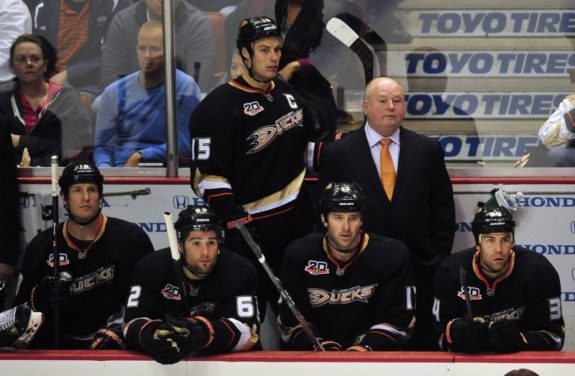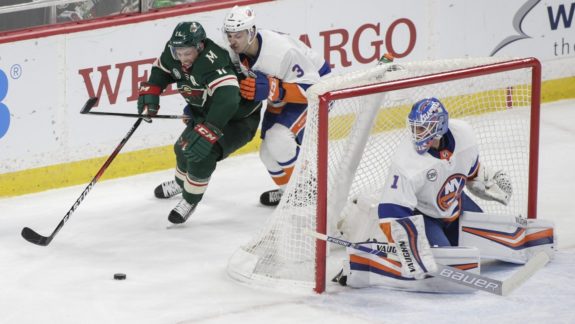The Minnesota Wild’s new general manager Bill Guerin has stated that Bruce Boudreau will return as head coach in the 2019-20 season and that he is the right choice for the team moving forward. After a disappointing season when the Wild had high expectations but missed the playoffs for the first time in seven years, many speculated that Boudreau was in the hot seat before Guerin made these comments.
In fact, before former GM Paul Fenton made the head-scratching trades that ultimately led to his dismissal, the Wild struggled with a veteran-heavy roster. When he traded Nino Niederreiter for Victor Rask on Jan. 17, the Wild had 49 points, putting them 5th in the Central Division, tied for the second wild card spot.
During his previous stints with the Washington Capitals and Anaheim Ducks, Boudreau was great during the regular season. In his four full seasons with the Capitals and five full seasons with the Ducks, he led his squads to be perennial conference champions — winning his conference in eight of nine seasons. However, he struggled in the playoffs, only reaching the Conference Finals once, which led to his abbreviated tenures with both teams.

When Boudreau signed with the Wild, fans gladly welcomed a coach with regular season success, hoping he could finally get the team out of “bubble-playoff-team” status. With a significantly less talented roster in Minnesota that prevented him from playing the physical style of hockey that he wanted, he was unable to boost his team to a Central Division championship. The highest the Wild has ever finished under him was second in the division, and they remain on the playoff bubble.
One thing that Boudreau did bring with him from Caps and Ducks was his playoff struggles, as the Wild lost in the first round to the St. Louis Blues and Winnipeg Jets in the two seasons that he led the team to the playoffs. The series weren’t close, as the Wild won just one game in each series.

Boudreau’s Style Doesn’t Mesh with the Wild’s Roster
When Boudreau arrived in Minnesota, he continued to employ (previous coach) Mike Yeo’s defensive-minded style – smart considering the Wild’s strengths are its goalie, established defense and defensive centers – but the Wild continued to struggle to find the back of the net and generate chances in the offensive zone.
Boudreau also never adapted as the Wild struggled and his system stopped working. In a division with top-tier goalies (when healthy) and heavy-hitting defensemen on almost every team, the Wild were outmatched in the offensive zone and had to work twice as hard as their opponents to score. In an evolving NHL that is becoming faster, generates more goals on the rush, and rewards talent over grit, his dump-and-chase and cycling down low in the zone style without a top-tier scorer is obsolete.

Additionally, after after losing the size and weight that Niederreiter and Charlie Coyle added to the lineup, the Wild’s newly constructed roster is not built for cycling low in the zone. New additions Ryan Donato and Kevin Fiala rely on their skill to produce offense and points, and being young players who still need to develop, Boudreau’s style does not provide these young players the opportunity to reach their full potential.
His constantly changing line combinations does not bode well for development or chemistry either. Over the past few seasons with relatively small forwards like Jason Zucker, Mikael Granlund, Tyler Ennis, Luke Kunin, JT Brown, and Mats Zuccarello (now), Boudreau’s dump-and-chase system, which relies on the forwards’ physicality, has been ineffective and will continue to be.
Boudreau Loves Physical Forwards
Boudreau has a special place in his heart for power forwards and grinders, players who are becoming less useful in today’s NHL if they are lacking sufficient skill. In Anaheim and Washington, he had Ryan Getzlaf, arguably the best power forward of his generation, Corey Perry, Pat Maroon, Chris Stewart, Tom Wilson, etc. who allowed him to focus on the physical style of hockey he wanted with concentrated size down low in the zone.

But in Minnesota, Boudreau does not have the size or talent to effectively play this way, and the team’s big players have different skill levels. He has dispersed the big players throughout the lineup in Minnesota: Marcus Foligno, Jordan Greenway, Charlie Coyle, etc. have not played on the same line. It would be more effective to have three big forwards play a checking-line role, which worked for him in the past and for other teams like the St. Louis Blues’ “fourth line” in the 2019 Stanley Cup Playoffs. The addition of Ryan Hartman adds another big player with grit for Boudreau to toy with, but this also prevents one of the team’s young, more skilled forwards from getting a chance to play significant minutes.
What Should Bill Guerin Do?
If Boudreau continues to fail to effectively use his power forwards to produce offense, Guerin needs to realize that Boudreau may not be the best man to coach the Wild. That being said, it is difficult to pin the Wild’s recent shortcomings on Boudreau, as he is working with one of the least talented rosters in the league without a superstar.
The bottom line, is that Boudreau has been using the same system for almost all of his coaching career and it does not mesh with the Wild’s roster — and the chance of it working in the future is slim. To be competitive in the Central Division, the Wild need to evolve into a team that can score on the rush, and Boudreau is not the right man to help the Wild achieve that.